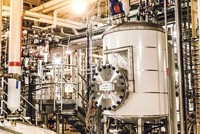Advertisement
Grab your lab coat. Let's get started
Welcome!
Welcome!
Create an account below to get 6 C&EN articles per month, receive newsletters and more - all free.
It seems this is your first time logging in online. Please enter the following information to continue.
As an ACS member you automatically get access to this site. All we need is few more details to create your reading experience.
Not you? Sign in with a different account.
Not you? Sign in with a different account.
ERROR 1
ERROR 1
ERROR 2
ERROR 2
ERROR 2
ERROR 2
ERROR 2
Password and Confirm password must match.
If you have an ACS member number, please enter it here so we can link this account to your membership. (optional)
ERROR 2
ACS values your privacy. By submitting your information, you are gaining access to C&EN and subscribing to our weekly newsletter. We use the information you provide to make your reading experience better, and we will never sell your data to third party members.
Food Ingredients
Newcomers head for zero-calorie sweetener market
Amyris and partners are latest to launch a fermentation-derived stevia sweetener
by Melody M. Bomgardner
December 6, 2018

Companies based on fermentation technology are pushing into the business of making rebaudioside M, a zero-calorie sweetener now extracted from the stevia plant.
The Bay-area biotech firm Amyris says it will launch a Reb M-based sweetener in 2019 for use in foods, beverages, and tabletop packets. It will produce the molecule from sugarcane syrup via fermentation with modified microbes.
Amyris intends to produce Reb M on a large scale and at purity levels above 95%. The firm points out that plant-based stevia sweeteners can contain bitter-tasting molecules. Reb M is considered the sweetest of stevia glycosides, but it exists in only tiny quantities in the stevia plant.
Amyris has linked up with ASR Group, the cane sugar refiner that owns the Domino Sugar and C&H Sugar brands. ASR has agreed to buy 80% of Amyris’s sweetener output for three years.
Another partner, Camil Alimentos, will market the sweetener to retail customers in Brazil. Also in Brazil, Amyris has inked a manufacturing partnership with cane sugar producer Raizen. And shoppers in the South American country will be the first to try a tabletop sweetener version of Reb M, made with help from the Swiss flavor firm Givaudan.
Amyris is not the only firm pursuing fermentation-derived steviol glycosides. Last month, agribusiness giant Cargill and specialty chemical firm DSM linked up to produce rebaudioside M and D. They are forming a new company, Avansya, that will make the sweeteners at a Cargill facility now under construction in Blair, Neb.
Smaller firms including the start-up Manus Bio and the natural ingredients supplier Blue California also have the capability to make the glycosides via fermentation.
Yet plant-derived stevia sweeteners have a decades-long head start over the new competition. At PureCircle, a pure-play stevia supplier to the food industry, CEO Maga Malsagov disputes the idea that plant-based sweeteners are low-purity. “Our products are 95-98% pure,” he tells C&EN.
Malsagov says brands use stevia sweeteners because ingredients made directly from plants is what their customers want. And he says scale and cost aren’t limiting use of stevia sweeteners. “The cost of the products we supply today is cheaper than sugar or high-fructose corn syrup. As we achieve economies of scale, that will come down even more.”
The new sweeteners have an opportunity to horn in on the market for artificial sweeteners, suggests Kantha Shelke, principal at food science and research firm Corvus Blue. “They would appear to have an edge over synthetic sweeteners, especially in today’s ‘clean label’ climate,” she says.
For Amyris and Avansya, taste will be more important than cost in appealing to food and beverage formulators, Shelke adds. “People are really tired of bad-tasting sugar alternatives. The concept of pure molecules tasting better than the plant-derived counterparts has to be proven in the marketplace.”




Join the conversation
Contact the reporter
Submit a Letter to the Editor for publication
Engage with us on Twitter